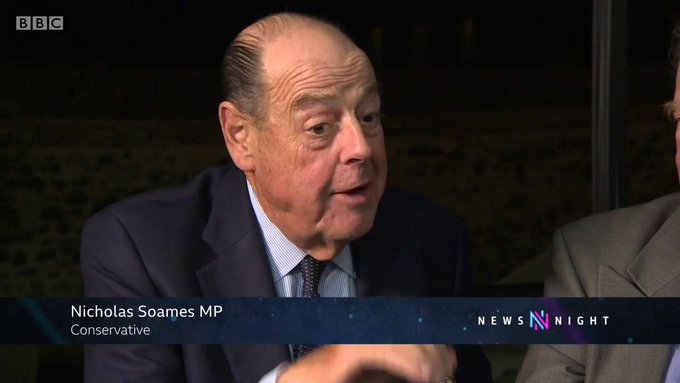BY TOBY YOUNG
On the face of it, it does seem unfair that someone who’s been in Parliament for 37 years and only defied the Conservative whip three times should be expelled from the party, as he pointed out on Newsnight:
Many Conservative MPs have rebelled far more often than Soames but haven’t had the whip removed. Why should he and the 20 other Tory MPs who voted against the Government on Tuesday night (3rd Sep 2019) be singled out in this way? The fact that he’s Winston Churchill’s grandson is neither here nor there – and Labour MPs banging on about that is absurd, as if one of the sacrosanct principles of parliamentary democracy is that membership of the Conservative Party is a hereditary right. But Ruth Davidson has a point, surely?
I’m afraid she doesn’t. The reason the 21 rebels have been expelled from the party isn’t because they rebelled per se. It’s because they rebelled on this particular issue. By voting against the Government and allowing an alliance of anti-no dealers to seize control of the order paper, thereby helping them to pass a bill extending the Brexit deadline, they have, in effect, attempted to derail the Government’s key Brexit strategy. That strategy, for those who haven’t been paying attention, is to threaten to leave the EU with no deal on October 31st because that’s the most effective way of persuading the EU to return to the negotiating table. If the Brexit deadline is extended again, the EU will have no incentive to renegotiate.
Now, Soames and some of the other rebels will claim that they gave due consideration to this strategy before deciding which way to vote on Tuesday night and, reluctantly, concluded it was hopeless. I think that judgment was premature. While it’s true that the EU hasn’t displayed much of an appetite for renegotiation until now, that’s because, until now, the EU hasn’t been convinced that Boris can see make good on his threat of leaving without a deal. Wouldn’t it have been more fair-minded of those rebels genuinely on the fence – as Soames claims to have been – to have continued to support Boris’s strategy up until the EU Summit on October 17th and only if the EU still refused to budge, then move to seize control of the order paper and try and pass an extension bill? If it can be done in a matter of days this week, why not in the week commencing October 21st?
There’s another consideration too – a more important one. If, as now seems likely, there will be a General Election in mid-October, how could the 21 rebels have stood for re-election under the Conservative banner? It’s a racing certainty that in the manifesto the party will commit to taking Britain out on October 31st, deal or no deal. How could the rebels have appeared before the electorate sporting blue rosettes while, at the same time, refusing to be bound by this pledge? Boris could have politely asked them not to and, who knows, perhaps some of them would have agreed to stand as independents. But not all and the only way Boris can ensure they don’t is to kick them out of the party. (Soames and some of the other rebels have said they don’t intend to stand for re-election, but Boris could hardly have made an exception for them and only withdrawn the whip from those rebels who do intend to stand.)
Why would it have mattered if some Conservative MPs stood for re-election on an anti-no deal platform? The reason, I think, is that it would introduce an element of doubt as to whether Boris could in fact take us out of the EU on October 31st, even if he wins a majority. After all, if the Conservative benches in the new Parliament contain some MPs who still intend to vote with the Opposition to frustrate Boris’s attempts to take us out, then winning a majority is no guarantee we’ll leave. That, in turn, means a vote for the Conservatives in the forthcoming election won’t necessarily be a vote to leave on October 31st, as much as Boris would like it to be. And you can bet your bottom dollar that Nigel Farage would exploit that fact. If you’re a committed Brexiteer, he would argue, how can you vote Conservative, knowing that there are some Tory candidates who will do everything in their power to prevent Britain leaving with no deal?
However, now that Boris has expelled them – now that every candidate standing under the Tory banner will be committed to leaving on October 31st, deal or no deal – it will be much harder for Farage to argue that Boris can’t be trusted. Indeed, by acting as he has, the Prime Minister has made it less likely that Brexiteers will desert him for Farage on October 15th or whenever the election is. He has shown that he’s in deadly earnest about leaving by October 31st. No ifs, not buts. And if he attends the European Summit on October 17th with a majority of committed Brexiteers behind him, there’s a chance he may get a new, better deal.
So even though it’s regrettable that loyal servants of the party like Nicholas Soames have had the whip withdrawn, I don’t think Boris had any alternative. Leaving them in would have made it impossible for him to fight the election on the platform he wants to fight it on and given a fatal opening to Nigel Farage.
One final point: now that the entire Parliamentary Conservative Party is singing from the same Brexit hymn sheet – they might as well be singing Jerusalem – it makes it more likely that a pact can be agreed between the Tories and the Brexit Party. And we all want that, obviously.
Toby Young is a broadcaster, writer and journalist. Follow him on twitter: @toadmeister
https://freemarketconservatives.org/why-boris-was-right-to-expel-tory-rebels-from-the-party/

